Short-Term Visitors, 2025-2026
 Hadar Avivi is an assistant professor at the Department of Economics at University College London, after spending the 2024-2025 academic year as a postdoctoral research associate in the Industrial Relations Section at Princeton University. Avivi studies topics in labor economics, intergenerational mobility, and applied econometrics. A recent working paper with Tslil Aloni, “One Land, Many Promises: Assessing the Consequences of Unequal Childhood Location Effects,” studies the causal effects of childhood residential location on the adult income of native-born Israeli children and the children of immigrants from the former Soviet Union. Childhood location effects vary substantially in Israel. While the place effects of high-income immigrants and natives are strongly correlated, location effects for low-income immigrants are uncorrelated with those for low-income natives. Avivi holds a BA in economics and history from Tel-Aviv University, and a PhD in economics from the University of California, Berkeley.
Hadar Avivi is an assistant professor at the Department of Economics at University College London, after spending the 2024-2025 academic year as a postdoctoral research associate in the Industrial Relations Section at Princeton University. Avivi studies topics in labor economics, intergenerational mobility, and applied econometrics. A recent working paper with Tslil Aloni, “One Land, Many Promises: Assessing the Consequences of Unequal Childhood Location Effects,” studies the causal effects of childhood residential location on the adult income of native-born Israeli children and the children of immigrants from the former Soviet Union. Childhood location effects vary substantially in Israel. While the place effects of high-income immigrants and natives are strongly correlated, location effects for low-income immigrants are uncorrelated with those for low-income natives. Avivi holds a BA in economics and history from Tel-Aviv University, and a PhD in economics from the University of California, Berkeley.
 Sir Timothy Besley is School Professor of Economics and Political Science and W. Arthur Lewis Professor of Development Economics at the London School of Economics and Political Science (LSE). From September 2006 to August 2009, he served as an external member of the Bank of England Monetary Policy Committee and since 2015 has been a member of the UK’s National Infrastructure Commission. He is also the GluskinGranovsky Fellow in the Institutions, Organizations and Growth Program of the Canadian Institute for Advanced Research (CIFAR). Besley was educated at Aylesbury Grammar School and Oxford University where he became a prize fellow of All Souls College. He taught subsequently at Princeton University before being appointed professor in the economics department at the LSE in 1995. He is a fellow of the Econometric Society, the British Academy, and the European Economic Association. He is also a foreign honorary member of the American Economic Association and of the American Academy of Arts and Sciences. He is a past president of the Royal Economic Society, European Economic Association, International Economic Association and the Econometric Society. Besley is a past co-editor of the American Economic Review, and a 2005 winner of the Yrjö Jahnsson Award of the European Economics Association which is granted every other year to an economist aged under 45 who has made a significant contribution to economics in Europe. His research, which mostly has a policy focus, is mainly in the areas of Development Economics, Public Economics and Political Economy.
Sir Timothy Besley is School Professor of Economics and Political Science and W. Arthur Lewis Professor of Development Economics at the London School of Economics and Political Science (LSE). From September 2006 to August 2009, he served as an external member of the Bank of England Monetary Policy Committee and since 2015 has been a member of the UK’s National Infrastructure Commission. He is also the GluskinGranovsky Fellow in the Institutions, Organizations and Growth Program of the Canadian Institute for Advanced Research (CIFAR). Besley was educated at Aylesbury Grammar School and Oxford University where he became a prize fellow of All Souls College. He taught subsequently at Princeton University before being appointed professor in the economics department at the LSE in 1995. He is a fellow of the Econometric Society, the British Academy, and the European Economic Association. He is also a foreign honorary member of the American Economic Association and of the American Academy of Arts and Sciences. He is a past president of the Royal Economic Society, European Economic Association, International Economic Association and the Econometric Society. Besley is a past co-editor of the American Economic Review, and a 2005 winner of the Yrjö Jahnsson Award of the European Economics Association which is granted every other year to an economist aged under 45 who has made a significant contribution to economics in Europe. His research, which mostly has a policy focus, is mainly in the areas of Development Economics, Public Economics and Political Economy.
 Michael Bordo is a Board of Governors Professor of Economics and director of the Center for Monetary and Financial History at Rutgers University. He has held previous academic positions at the University of South Carolina and Carleton University. Bordo has been a visiting professor at the University of California, Los Angeles, Carnegie Mellon University, Princeton University, Harvard University, and Cambridge University, where he was Pitt Professor of American History and Institutions. He is currently a Distinguished Visiting Fellow at the Hoover Institution, Stanford University. He has been a visiting scholar at the International Monetary Fund, the Federal Reserve Banks of St. Louis, Cleveland, and Dallas, the Federal Reserve Board of Governors, the Bank of Canada, the Bank of England, and the Bank for International Settlement. He is a research associate of the National Bureau of Economic Research. He is also a member of the Shadow Open Market Committee. He has a BA degree from McGill University, an MSc in economics from the London School of Economics, and PhD from the University of Chicago. He has published many articles in leading journals and eighteen books on monetary economics and monetary history. His latest book is The Historical Performance of the Federal Reserve: The Importance of Rules (2019). He is editor of a series of books for Cambridge University Press: Studies in Macroeconomic History.
Michael Bordo is a Board of Governors Professor of Economics and director of the Center for Monetary and Financial History at Rutgers University. He has held previous academic positions at the University of South Carolina and Carleton University. Bordo has been a visiting professor at the University of California, Los Angeles, Carnegie Mellon University, Princeton University, Harvard University, and Cambridge University, where he was Pitt Professor of American History and Institutions. He is currently a Distinguished Visiting Fellow at the Hoover Institution, Stanford University. He has been a visiting scholar at the International Monetary Fund, the Federal Reserve Banks of St. Louis, Cleveland, and Dallas, the Federal Reserve Board of Governors, the Bank of Canada, the Bank of England, and the Bank for International Settlement. He is a research associate of the National Bureau of Economic Research. He is also a member of the Shadow Open Market Committee. He has a BA degree from McGill University, an MSc in economics from the London School of Economics, and PhD from the University of Chicago. He has published many articles in leading journals and eighteen books on monetary economics and monetary history. His latest book is The Historical Performance of the Federal Reserve: The Importance of Rules (2019). He is editor of a series of books for Cambridge University Press: Studies in Macroeconomic History.
 Ilisa Goenka is a fifth-year PhD candidate in economics and econometrics at CERGE-EI. Her research focuses on topics in quantitative macroeconomics, household finance and behavioral macroeconomics. Currently, she is working on a behavioral life-cycle model that aims to explain several MPC puzzles jointly. In another project, she is studying the welfare implications of a labor income tax reform in the Czech Republic in an Aiyagari model with endogenous labor. She was previously a visiting student at the University of Copenhagen. Goenka is a 2025 Staplelon Scholars Award recipient and has received multiple performance scholarships. Before pursuing her PhD, she worked as a research associate at CAFRAL, a research organization promoted by the Reserve Bank of India. Goenka received her MA from Ashoka University and her BSc from the University of Calcutta, both in economics.
Ilisa Goenka is a fifth-year PhD candidate in economics and econometrics at CERGE-EI. Her research focuses on topics in quantitative macroeconomics, household finance and behavioral macroeconomics. Currently, she is working on a behavioral life-cycle model that aims to explain several MPC puzzles jointly. In another project, she is studying the welfare implications of a labor income tax reform in the Czech Republic in an Aiyagari model with endogenous labor. She was previously a visiting student at the University of Copenhagen. Goenka is a 2025 Staplelon Scholars Award recipient and has received multiple performance scholarships. Before pursuing her PhD, she worked as a research associate at CAFRAL, a research organization promoted by the Reserve Bank of India. Goenka received her MA from Ashoka University and her BSc from the University of Calcutta, both in economics.
 Winnie Njoroge is a fifth-year PhD candidate in economics and econometrics and a junior researcher at CERGE-EI. Njoroge’s research lies at the intersection of experimental economics, behavioral economics, and development economics. Her recent work uses experimental methods to study social and economic inequalities, with a particular focus on labor market discrimination and understanding the role of religion in shaping human behavior. Her work on labor market discrimination uses a natural field experiment to investigate how job seekers respond to anticipated ethnic discrimination in the hiring process. In her work on religion, Njoroge explores whether and how religious leaders influence decisions of their congregants, with a focus on gender roles and interreligious bias, using lab-in-the-field experiments. She is also a visiting student researcher at the University of California, Berkeley, during the Spring 2026 semester. Njoroge holds an MA and a BA in economics from the University of Nairobi.
Winnie Njoroge is a fifth-year PhD candidate in economics and econometrics and a junior researcher at CERGE-EI. Njoroge’s research lies at the intersection of experimental economics, behavioral economics, and development economics. Her recent work uses experimental methods to study social and economic inequalities, with a particular focus on labor market discrimination and understanding the role of religion in shaping human behavior. Her work on labor market discrimination uses a natural field experiment to investigate how job seekers respond to anticipated ethnic discrimination in the hiring process. In her work on religion, Njoroge explores whether and how religious leaders influence decisions of their congregants, with a focus on gender roles and interreligious bias, using lab-in-the-field experiments. She is also a visiting student researcher at the University of California, Berkeley, during the Spring 2026 semester. Njoroge holds an MA and a BA in economics from the University of Nairobi.
 Gillian Paull is a senior visiting fellow at the Centre for Analysis of Social Exclusion (CASE) at the London School of Economics and Political Science. Previously, Paull worked at the International Monetary Fund, World Bank, Institute for Fiscal Studies, and Frontier Economics. Her research has focused on analyzing and evaluating policy relating to early years, childcare, women’s employment and poverty, delivering academic articles as well as a wide range of policy-related reports for DWP, DfE, and non-governmental organizations. She has also served as a specialist advisor to the House of Lords Committee on Affordable Childcare. Paull holds a PhD in economics and an MPA from Princeton University.
Gillian Paull is a senior visiting fellow at the Centre for Analysis of Social Exclusion (CASE) at the London School of Economics and Political Science. Previously, Paull worked at the International Monetary Fund, World Bank, Institute for Fiscal Studies, and Frontier Economics. Her research has focused on analyzing and evaluating policy relating to early years, childcare, women’s employment and poverty, delivering academic articles as well as a wide range of policy-related reports for DWP, DfE, and non-governmental organizations. She has also served as a specialist advisor to the House of Lords Committee on Affordable Childcare. Paull holds a PhD in economics and an MPA from Princeton University.
 Philipp Strack is the director of the Cowles Foundation for Research in Economics at Yale University. He is the Cowles Foundation Professor of Economics, and has a secondary appointment as Professor of Computer Science. He joined Yale in 2019 as an associate professor, having previously served as a faculty member at the University of California Berkeley and a postdoc at Microsoft Research Boston. He received the AEA John Bates Clark Medal in 2024, that is awarded annually to that American economist under the age of forty who is judged to have made the most significant contribution to economic thought and knowledge. Strack holds a PhD in economics from the University of Bonn, Germany.
Philipp Strack is the director of the Cowles Foundation for Research in Economics at Yale University. He is the Cowles Foundation Professor of Economics, and has a secondary appointment as Professor of Computer Science. He joined Yale in 2019 as an associate professor, having previously served as a faculty member at the University of California Berkeley and a postdoc at Microsoft Research Boston. He received the AEA John Bates Clark Medal in 2024, that is awarded annually to that American economist under the age of forty who is judged to have made the most significant contribution to economic thought and knowledge. Strack holds a PhD in economics from the University of Bonn, Germany.
 Gabriel Zucman is Professor of economics at the Paris School of Economics and Ecole normale supérieure – PSL, Summer Research Professor at the University of California, Berkeley, and founding Director of the EU Tax Observatory. He is the author of articles published in journals such as Quarterly Journal of Economics, American Economic Review, Review of Economic Studies, and of two books. His research focuses on the accumulation, distribution, and taxation of global wealth and has renewed the analysis of the macroeconomic and distributional implications of globalization. In a series of papers and in his book The Hidden Wealth of Nations, he has developed methods to measure the wealth held in tax havens. The Triumph of Injustice, written with Emmanuel Saez, presents an analysis of the progressivity of the US tax system taking into account all taxes at all levels of government since the creation of the income tax in 1913. The book, supplemented by an open-source tax reform simulator, proposes to reinvent progressive taxation around three pillars: a progressive wealth tax, a new way to tax multinational companies, and a national income tax. He received the AEA John Bates Clark Medal in 2023.
Gabriel Zucman is Professor of economics at the Paris School of Economics and Ecole normale supérieure – PSL, Summer Research Professor at the University of California, Berkeley, and founding Director of the EU Tax Observatory. He is the author of articles published in journals such as Quarterly Journal of Economics, American Economic Review, Review of Economic Studies, and of two books. His research focuses on the accumulation, distribution, and taxation of global wealth and has renewed the analysis of the macroeconomic and distributional implications of globalization. In a series of papers and in his book The Hidden Wealth of Nations, he has developed methods to measure the wealth held in tax havens. The Triumph of Injustice, written with Emmanuel Saez, presents an analysis of the progressivity of the US tax system taking into account all taxes at all levels of government since the creation of the income tax in 1913. The book, supplemented by an open-source tax reform simulator, proposes to reinvent progressive taxation around three pillars: a progressive wealth tax, a new way to tax multinational companies, and a national income tax. He received the AEA John Bates Clark Medal in 2023.
Short-Term Visitors, 2024-2025
 Jessica Brown is an assistant professor of economics at the Darla Moore School of Business at the University of South Carolina. Brown also is a research fellow at IZA and a faculty affiliate at the Wilson-Sheehan Lab for Economic Opportunities. Her research interests are labor economics and public economics, and current research projects focus primarily on the economics of the child care market. She has studied how the child care market responds to macroeconomic conditions, the minimum wage, and immigration enforcement. Current projects focus on understanding the pricing behavior of child care providers and estimating the impact of private equity on the market. Her research has been published in journals such as the Journal of Labor Economics, Journal of Public Economics, and the Journal of Health Economics and is supported by grants from the Alfred P. Sloan Foundation and the Washington Center for Equitable Growth. Her expertise on the child care market has also been featured in major media outlets, including the New York Times, Washington Post, and NPR’s Planet Money. Brown holds a BS in mathematics and economics from the University of Notre Dame and a PhD in economics from Princeton University.
Jessica Brown is an assistant professor of economics at the Darla Moore School of Business at the University of South Carolina. Brown also is a research fellow at IZA and a faculty affiliate at the Wilson-Sheehan Lab for Economic Opportunities. Her research interests are labor economics and public economics, and current research projects focus primarily on the economics of the child care market. She has studied how the child care market responds to macroeconomic conditions, the minimum wage, and immigration enforcement. Current projects focus on understanding the pricing behavior of child care providers and estimating the impact of private equity on the market. Her research has been published in journals such as the Journal of Labor Economics, Journal of Public Economics, and the Journal of Health Economics and is supported by grants from the Alfred P. Sloan Foundation and the Washington Center for Equitable Growth. Her expertise on the child care market has also been featured in major media outlets, including the New York Times, Washington Post, and NPR’s Planet Money. Brown holds a BS in mathematics and economics from the University of Notre Dame and a PhD in economics from Princeton University.
Claudia Goldin is the Henry Lee Professor of Economics at Harvard University, and holds the Lee and Ezpeleta Professorship of Arts & Sciences at Harvard University. Goldin was the director of the NBER’s Development of the American Economy program from 1989 to 2017, and is a co-director of the NBER’s Gender in the Economy group. Goldin was awarded the 2023 Sveriges Riksbank Prize in Economic Sciences in Memory of Alfred Nobel “for having advanced our understanding of women’s labour market outcomes.” An economic historian and a labor economist, Goldin’s research covers a wide range of topics, including the female labor force, the gender gap in earnings, income inequality, technological change, education, and immigration. Most of her research interprets the present through the lens of the past and explores the origins of current issues of concern. Her most recent book is Career & Family: Women’s Century-Long Journey toward Equity (Princeton University Press, 2021). She is the author and editor of several books, among them Understanding the Gender Gap: An Economic History of American Women (1990), The Regulated Economy: A Historical Approach to Political Economy (with G. Libecap, 1994), The Defining Moment: The Great Depression and the American Economy in the Twentieth Century (with M. Bordo and E. White, 1998), Corruption and Reform: Lesson’s from America’s Economic History (with E. Glaeser, 2006), and Women Working Longer: Increased Employment at Older Ages (with L. Katz, 2018). Her book The Race between Education and Technology (with L. Katz; 2008, 2010) was the winner of the 2008 R.R. Hawkins Award for the most outstanding scholarly work in all disciplines of the arts and sciences. Goldin is best known for her historical work on women in the US economy. Her most influential papers in that area have concerned the history of women’s quest for career and family, coeducation in higher education, the impact of the “Pill” on women’s career and marriage decisions, women’s surnames after marriage as a social indicator, the reasons why women are now the majority of undergraduates, and the new lifecycle of women’s employment. Goldin received her BA from Cornell University and her PhD from the University of Chicago.
is the Henry Lee Professor of Economics at Harvard University, and holds the Lee and Ezpeleta Professorship of Arts & Sciences at Harvard University. Goldin was the director of the NBER’s Development of the American Economy program from 1989 to 2017, and is a co-director of the NBER’s Gender in the Economy group. Goldin was awarded the 2023 Sveriges Riksbank Prize in Economic Sciences in Memory of Alfred Nobel “for having advanced our understanding of women’s labour market outcomes.” An economic historian and a labor economist, Goldin’s research covers a wide range of topics, including the female labor force, the gender gap in earnings, income inequality, technological change, education, and immigration. Most of her research interprets the present through the lens of the past and explores the origins of current issues of concern. Her most recent book is Career & Family: Women’s Century-Long Journey toward Equity (Princeton University Press, 2021). She is the author and editor of several books, among them Understanding the Gender Gap: An Economic History of American Women (1990), The Regulated Economy: A Historical Approach to Political Economy (with G. Libecap, 1994), The Defining Moment: The Great Depression and the American Economy in the Twentieth Century (with M. Bordo and E. White, 1998), Corruption and Reform: Lesson’s from America’s Economic History (with E. Glaeser, 2006), and Women Working Longer: Increased Employment at Older Ages (with L. Katz, 2018). Her book The Race between Education and Technology (with L. Katz; 2008, 2010) was the winner of the 2008 R.R. Hawkins Award for the most outstanding scholarly work in all disciplines of the arts and sciences. Goldin is best known for her historical work on women in the US economy. Her most influential papers in that area have concerned the history of women’s quest for career and family, coeducation in higher education, the impact of the “Pill” on women’s career and marriage decisions, women’s surnames after marriage as a social indicator, the reasons why women are now the majority of undergraduates, and the new lifecycle of women’s employment. Goldin received her BA from Cornell University and her PhD from the University of Chicago.
 Dmitry Grozoubinski is the founder and lead trainer of ExplainTrade and a visiting professor at the University of Strathclyde School of Law. He is a negotiations and trade policy expert specializing in accessibly communicating these complex worlds in a way relevant to businesses, officials and the general public. Prior to launching ExplainTrade.com in 2019, Grozoubinski served as an Australian diplomat and trade negotiator at the World Trade Organization and beyond. He has negotiated complex agreements in Geneva, at WTO and UN Ministerial Conferences in Kenya, and as part of the (Malaysia Airlines Flight) MH17 Task-force in Kyiv, Ukraine. Before joining the Department of Foreign Affairs and Trade, he was a lecturer and tutor at the Monash Graduate School of Business and with the Australian trade consultancy TradeWorthy. Grozoubinski holds a BA in political science from the University of Melbourne and a Masters of Diplomacy and Trade from the School of Business at Monash University.
Dmitry Grozoubinski is the founder and lead trainer of ExplainTrade and a visiting professor at the University of Strathclyde School of Law. He is a negotiations and trade policy expert specializing in accessibly communicating these complex worlds in a way relevant to businesses, officials and the general public. Prior to launching ExplainTrade.com in 2019, Grozoubinski served as an Australian diplomat and trade negotiator at the World Trade Organization and beyond. He has negotiated complex agreements in Geneva, at WTO and UN Ministerial Conferences in Kenya, and as part of the (Malaysia Airlines Flight) MH17 Task-force in Kyiv, Ukraine. Before joining the Department of Foreign Affairs and Trade, he was a lecturer and tutor at the Monash Graduate School of Business and with the Australian trade consultancy TradeWorthy. Grozoubinski holds a BA in political science from the University of Melbourne and a Masters of Diplomacy and Trade from the School of Business at Monash University.
 Yaroslav Korobka is a fourth-year PhD candidate in economics and econometrics at CERGE-EI, with a focus on econometrics, statistics, and machine learning. His research interests include modeling with many regressors and applying machine learning methods in economic contexts. Korobka has worked on projects involving nonparametric estimation with many fixed effects, model averaging with a diverging number of covariates, and semiparametric specification testing. In recent work, he has focused on generalization of the functional dependence between covariates and outcomes in types of models explaining the wage decomposition. Korobka holds a MA in economic research from CERGE-EI; and a MA in statistical methods and a BA in finance, both from Masaryk University. He has received several awards, including the CERGE-EI Stapleton Award and multiple performance scholarships.
Yaroslav Korobka is a fourth-year PhD candidate in economics and econometrics at CERGE-EI, with a focus on econometrics, statistics, and machine learning. His research interests include modeling with many regressors and applying machine learning methods in economic contexts. Korobka has worked on projects involving nonparametric estimation with many fixed effects, model averaging with a diverging number of covariates, and semiparametric specification testing. In recent work, he has focused on generalization of the functional dependence between covariates and outcomes in types of models explaining the wage decomposition. Korobka holds a MA in economic research from CERGE-EI; and a MA in statistical methods and a BA in finance, both from Masaryk University. He has received several awards, including the CERGE-EI Stapleton Award and multiple performance scholarships.
 Kory Kroft is a professor in the Department of Economics at the University of Toronto, and a research associate at the National Bureau of Economic Research. His areas of interest include public economics, labor economics, and psychology and economics. Specific interests: imperfect competition in labor markets, rent sharing and wage inequality; production networks, automation and outsourcing; causes and consequences of long-term unemployment; experimental effects of job training and pre-employment programs; and incidence and efficiency costs of taxation and social insurance programs. He has been published in distinguished journals including the American Economic Review, American Economic Journal: Applied Economics, and Journal of Public Economics. Kroft received his BA from University of Western Ontario, his MA from Queens University, and his PhD from the University of California, Berkeley, all in economics. He also completed post-doctoral work at Yale University.
Kory Kroft is a professor in the Department of Economics at the University of Toronto, and a research associate at the National Bureau of Economic Research. His areas of interest include public economics, labor economics, and psychology and economics. Specific interests: imperfect competition in labor markets, rent sharing and wage inequality; production networks, automation and outsourcing; causes and consequences of long-term unemployment; experimental effects of job training and pre-employment programs; and incidence and efficiency costs of taxation and social insurance programs. He has been published in distinguished journals including the American Economic Review, American Economic Journal: Applied Economics, and Journal of Public Economics. Kroft received his BA from University of Western Ontario, his MA from Queens University, and his PhD from the University of California, Berkeley, all in economics. He also completed post-doctoral work at Yale University.
 Adriana Kugler took office as a member of the Board of Governors of the Federal Reserve System on September 13, 2023, to fill an unexpired term ending January 31, 2026. Prior to her appointment at the Board, Kugler served as the US Executive Director at the World Bank Group. She is on leave from Georgetown University where she is a professor of Public Policy and Economics and was vice provost for faculty. Previously, she served as chief economist at the US Department of Labor from 2011–13. Kugler was also a research associate of the National Bureau of Economic Research and of the Center for the Study of Poverty and Inequality at Stanford University. Kugler’s other professional appointments include being the elected chair of the Business and Economics Statistics Section of the American Statistical Association. She was also a member of the Board on Science, Technology and Economic Policy of the National Academies of Sciences and served on the Technical Advisory Committee of the Bureau of Labor Statistics. Kugler received a BA in economics and political science from McGill University and a PhD in economics from the University of California, Berkeley.
Adriana Kugler took office as a member of the Board of Governors of the Federal Reserve System on September 13, 2023, to fill an unexpired term ending January 31, 2026. Prior to her appointment at the Board, Kugler served as the US Executive Director at the World Bank Group. She is on leave from Georgetown University where she is a professor of Public Policy and Economics and was vice provost for faculty. Previously, she served as chief economist at the US Department of Labor from 2011–13. Kugler was also a research associate of the National Bureau of Economic Research and of the Center for the Study of Poverty and Inequality at Stanford University. Kugler’s other professional appointments include being the elected chair of the Business and Economics Statistics Section of the American Statistical Association. She was also a member of the Board on Science, Technology and Economic Policy of the National Academies of Sciences and served on the Technical Advisory Committee of the Bureau of Labor Statistics. Kugler received a BA in economics and political science from McGill University and a PhD in economics from the University of California, Berkeley.
 Camille Landais is a professor of economics at The London School of Economics and Political Science (LSE), and director of the Public Economics Programme of the Centre for Economic Policy Research (CEPR). In addition to his academic position, he is also the President-Delegue at the French Council of Economic Advisers (CAE). He maintains affiliations with the Institut des politiques publiques, Institute for Fiscal Studies, STICERD, IZA Institute of Labour Economics, and the European Economic Association, on whose council he sits. Additionally, he is performing or has performed editorial duties for the American Economic Journal: Applied Economics, Journal of Public Economics, Review of Economic Studies, Fiscal Studies and Economic Policy. His research focuses on public finance and labor economics and his articles have appeared in various leading journals such as the American Economic Review, or the Quarterly Journal of Economics. Landais earned his undergraduate degree from Ecole Normale Supérieure (Ulm) and his PhD from the Paris School of Economics.
Camille Landais is a professor of economics at The London School of Economics and Political Science (LSE), and director of the Public Economics Programme of the Centre for Economic Policy Research (CEPR). In addition to his academic position, he is also the President-Delegue at the French Council of Economic Advisers (CAE). He maintains affiliations with the Institut des politiques publiques, Institute for Fiscal Studies, STICERD, IZA Institute of Labour Economics, and the European Economic Association, on whose council he sits. Additionally, he is performing or has performed editorial duties for the American Economic Journal: Applied Economics, Journal of Public Economics, Review of Economic Studies, Fiscal Studies and Economic Policy. His research focuses on public finance and labor economics and his articles have appeared in various leading journals such as the American Economic Review, or the Quarterly Journal of Economics. Landais earned his undergraduate degree from Ecole Normale Supérieure (Ulm) and his PhD from the Paris School of Economics.
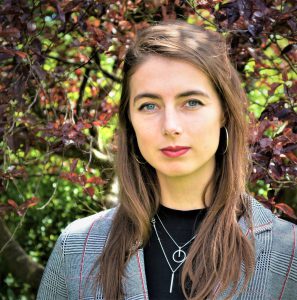 Anna Stansbury is the Class of 1948 Career Development Assistant Professor and an Assistant Professor of Work and Organization Studies at the MIT Sloan School of Management, and is in the core faculty of the MIT Institute for Work and Employment Research. She is also a nonresident senior fellow at the Peterson Institute for International Economics. Stansbury’s research focuses on topics in labor and macroeconomics, particularly on issues to do with inequality, power, and institutions in the labor market. In recent work, she has studied the extent of employer concentration in the US labor market, the macroeconomic effects of the decline of worker power in the US, and the incentives for minimum wage non-compliance in the US and the UK. Stansbury holds a BA in economics from Cambridge University, a Master’s in Public Policy from the Harvard Kennedy School, and an MA and PhD in economics from Harvard University.
Anna Stansbury is the Class of 1948 Career Development Assistant Professor and an Assistant Professor of Work and Organization Studies at the MIT Sloan School of Management, and is in the core faculty of the MIT Institute for Work and Employment Research. She is also a nonresident senior fellow at the Peterson Institute for International Economics. Stansbury’s research focuses on topics in labor and macroeconomics, particularly on issues to do with inequality, power, and institutions in the labor market. In recent work, she has studied the extent of employer concentration in the US labor market, the macroeconomic effects of the decline of worker power in the US, and the incentives for minimum wage non-compliance in the US and the UK. Stansbury holds a BA in economics from Cambridge University, a Master’s in Public Policy from the Harvard Kennedy School, and an MA and PhD in economics from Harvard University.
Short-Term Visitors, 2023-2024
 Daron Acemoglu is an Institute Professor at MIT and an elected fellow of the National Academy of Sciences, American Philosophical Society, the British Academy of Sciences, the Turkish Academy of Sciences, the American Academy of Arts and Sciences, the Econometric Society, the European Economic Association, and the Society of Labor Economists. He is also a member of the Group of Thirty. He is the author of five books, including: Why Nations Fail: Power, Prosperity, and Poverty (joint with James Robinson), Introduction to Modern Economic Growth, and The Narrow Corridor: States, Societies, and the Fate of Liberty (with James Robinson). His academic work covers a wide range of areas, including political economy, economic development, economic growth, technological change, inequality, labor economics, and economics of networks. Acemoglu received the inaugural T. W. Shultz Prize from the University of Chicago in 2004, and the inaugural Sherwin Rosen Award for outstanding contribution to labor economics in 2004, Distinguished Science Award from the Turkish Sciences Association in 2006, the John von Neumann Award, Rajk College, Budapest in 2007, the Carnegie Fellowship in 2017, the Jean-Jacques Laffont Prize in 2018, the Global Economy Prize in 2019, and the CME Mathematical and Statistical Research Institute prize in 2021. Acemoglu received a BA from the University of York, and PhD and MSc. degrees from the London School of Economics.
Daron Acemoglu is an Institute Professor at MIT and an elected fellow of the National Academy of Sciences, American Philosophical Society, the British Academy of Sciences, the Turkish Academy of Sciences, the American Academy of Arts and Sciences, the Econometric Society, the European Economic Association, and the Society of Labor Economists. He is also a member of the Group of Thirty. He is the author of five books, including: Why Nations Fail: Power, Prosperity, and Poverty (joint with James Robinson), Introduction to Modern Economic Growth, and The Narrow Corridor: States, Societies, and the Fate of Liberty (with James Robinson). His academic work covers a wide range of areas, including political economy, economic development, economic growth, technological change, inequality, labor economics, and economics of networks. Acemoglu received the inaugural T. W. Shultz Prize from the University of Chicago in 2004, and the inaugural Sherwin Rosen Award for outstanding contribution to labor economics in 2004, Distinguished Science Award from the Turkish Sciences Association in 2006, the John von Neumann Award, Rajk College, Budapest in 2007, the Carnegie Fellowship in 2017, the Jean-Jacques Laffont Prize in 2018, the Global Economy Prize in 2019, and the CME Mathematical and Statistical Research Institute prize in 2021. Acemoglu received a BA from the University of York, and PhD and MSc. degrees from the London School of Economics.
 Lyn Alden is a financial analyst with a background in engineering and management. She spent over a decade at the Federal Aviation Administration’s William J. Hughes Technical Center in a variety of technical and financial roles, with the most recent being the head engineer and financial allocator for the center’s simulation branch. In 2016 she founded Lyn Alden Investment Strategy, which provides research to retail and institutional investors with a focus on monetary systems and energy systems. Lyn is a general partner at the bitcoin-focused venture firm Ego Death Capital, is a board director at the financial technology firm Swan Bitcoin, and is the author of Broken Money, which explores the past, present, and future of money through the lens of technology. She has a bachelor’s in Electronics Engineering from Penn State University and a master’s in Engineering Management from Rowan University, with a focus on Engineering Economics and Financial Modeling.
Lyn Alden is a financial analyst with a background in engineering and management. She spent over a decade at the Federal Aviation Administration’s William J. Hughes Technical Center in a variety of technical and financial roles, with the most recent being the head engineer and financial allocator for the center’s simulation branch. In 2016 she founded Lyn Alden Investment Strategy, which provides research to retail and institutional investors with a focus on monetary systems and energy systems. Lyn is a general partner at the bitcoin-focused venture firm Ego Death Capital, is a board director at the financial technology firm Swan Bitcoin, and is the author of Broken Money, which explores the past, present, and future of money through the lens of technology. She has a bachelor’s in Electronics Engineering from Penn State University and a master’s in Engineering Management from Rowan University, with a focus on Engineering Economics and Financial Modeling.
 Gayane Baghumyan is a 2023 Stapleton Scholars Award recipient, and a fifth-year PhD student and Junior Researcher at CERGE-EI. Her main research interests are experimental and behavioral economics, and she is currently working on two projects: Sexual-orientation discrimination and biological attributions: Experimental evidence from Russia; and Causal evidence of the role of religiosity on sexual-orientation discrimination. Furthermore, Baghumyan explores the most effective ways to inform the general population about the dangers of climate change and how the presentation of information can impact individuals’ beliefs and attitudes in this domain. Baghumyan received her BA and MA degrees in economics from the Armenian State University of Economics (ASUE) in Yerevan, Armenia.
Gayane Baghumyan is a 2023 Stapleton Scholars Award recipient, and a fifth-year PhD student and Junior Researcher at CERGE-EI. Her main research interests are experimental and behavioral economics, and she is currently working on two projects: Sexual-orientation discrimination and biological attributions: Experimental evidence from Russia; and Causal evidence of the role of religiosity on sexual-orientation discrimination. Furthermore, Baghumyan explores the most effective ways to inform the general population about the dangers of climate change and how the presentation of information can impact individuals’ beliefs and attitudes in this domain. Baghumyan received her BA and MA degrees in economics from the Armenian State University of Economics (ASUE) in Yerevan, Armenia.
 Chanelle Duley is a lecturer (assistant professor) in economics at the University of Auckland, where she completed a PhD in economics in February 2023. Her research focuses on topics in international economics, banking, macroeconomics, and political economy. She is currently working on projects on friendshoring and firm boundaries, as well as on cultural assimilation and nation building. Her work on friendshoring explores how strategic uncertainty determines the boundary of a firm, and the incentives of policymakers to shift critical parts of international supply chains to allies and friendly trading partners. In her work on cultural assimilation, Duley develops a game-theoretic model to investigate how cultural values facilitate market and non-market based exchange, and the distributional effects of nation building policies that foster assimilation or biculturalism. In 2022, Duley completed a PhD Fellowship at the Bank for International Settlements.
Chanelle Duley is a lecturer (assistant professor) in economics at the University of Auckland, where she completed a PhD in economics in February 2023. Her research focuses on topics in international economics, banking, macroeconomics, and political economy. She is currently working on projects on friendshoring and firm boundaries, as well as on cultural assimilation and nation building. Her work on friendshoring explores how strategic uncertainty determines the boundary of a firm, and the incentives of policymakers to shift critical parts of international supply chains to allies and friendly trading partners. In her work on cultural assimilation, Duley develops a game-theoretic model to investigate how cultural values facilitate market and non-market based exchange, and the distributional effects of nation building policies that foster assimilation or biculturalism. In 2022, Duley completed a PhD Fellowship at the Bank for International Settlements.
 Amy Finkelstein is the John & Jennie S. MacDonald Professor of Economics at the Massachusetts Institute of Technology. Prior to joining the MIT faculty in 2005, she was a Junior Fellow at the Harvard Society of Fellows. She is the co-founder and co-scientific director of J-PAL North America, a research center at MIT that encourages and facilitates randomized evaluations of important domestic policy issues. She is also the founding editor of American Economic Review: Insights and the co-director of the Health Care Program at the National Bureau of Economic Research. She is a member of the National Academy of Sciences and of the Institute of Medicine, and a fellow of the American Academy of Arts and Sciences and of the Econometric Society. Finkelstein’s areas of specialization are public finance and health economics. Her research focuses on market failures and government intervention in insurance markets, and on the economics of healthcare delivery. From 2008-2020 she served as co-director of the Public Economics Program at the National Bureau of Economic Research. She has received numerous awards and fellowships for her research, including a MacArthur Foundation Fellowship (2018) and the John Bates Clark Medal (2012), given annually to the economist under the age of 40 who is judged to have made the most significant contribution to economic thought and knowledge. Finkelstein received her PhD in economics from MIT, an M.Phil in economics from Oxford University where she studied as a Marshall Scholar, and an AB in government from Harvard University.
Amy Finkelstein is the John & Jennie S. MacDonald Professor of Economics at the Massachusetts Institute of Technology. Prior to joining the MIT faculty in 2005, she was a Junior Fellow at the Harvard Society of Fellows. She is the co-founder and co-scientific director of J-PAL North America, a research center at MIT that encourages and facilitates randomized evaluations of important domestic policy issues. She is also the founding editor of American Economic Review: Insights and the co-director of the Health Care Program at the National Bureau of Economic Research. She is a member of the National Academy of Sciences and of the Institute of Medicine, and a fellow of the American Academy of Arts and Sciences and of the Econometric Society. Finkelstein’s areas of specialization are public finance and health economics. Her research focuses on market failures and government intervention in insurance markets, and on the economics of healthcare delivery. From 2008-2020 she served as co-director of the Public Economics Program at the National Bureau of Economic Research. She has received numerous awards and fellowships for her research, including a MacArthur Foundation Fellowship (2018) and the John Bates Clark Medal (2012), given annually to the economist under the age of 40 who is judged to have made the most significant contribution to economic thought and knowledge. Finkelstein received her PhD in economics from MIT, an M.Phil in economics from Oxford University where she studied as a Marshall Scholar, and an AB in government from Harvard University.
 Peter Ganong is an associate professor of public policy at the University of Chicago Harris School, and a faculty research fellow at the National Bureau of Economic Research. Ganong has spent two years in public service: one at the White House Council of Economic Advisers and one at the City of Boston’s Citywide Analytics Team. He has taught at the University of Chicago since 2017 and was a Visiting Assistant Professor at MIT during fall of 2021. He studies the effect of public policies on people facing difficult financial circumstances. In his research on the foreclosure crisis, he found that most borrowers defaulted due to insufficient liquidity and that many foreclosures could have been averted through liquidity-focused modifications to mortgages. He also has found that unemployment benefits play a crucial role in sustaining the consumption of unemployed workers. In ongoing work, he is studying the effects of racial wealth inequality and the effects of high liquidity on the US economy. Ganong received his AB in economics and math, and his PhD in economics, both from Harvard University.
Peter Ganong is an associate professor of public policy at the University of Chicago Harris School, and a faculty research fellow at the National Bureau of Economic Research. Ganong has spent two years in public service: one at the White House Council of Economic Advisers and one at the City of Boston’s Citywide Analytics Team. He has taught at the University of Chicago since 2017 and was a Visiting Assistant Professor at MIT during fall of 2021. He studies the effect of public policies on people facing difficult financial circumstances. In his research on the foreclosure crisis, he found that most borrowers defaulted due to insufficient liquidity and that many foreclosures could have been averted through liquidity-focused modifications to mortgages. He also has found that unemployment benefits play a crucial role in sustaining the consumption of unemployed workers. In ongoing work, he is studying the effects of racial wealth inequality and the effects of high liquidity on the US economy. Ganong received his AB in economics and math, and his PhD in economics, both from Harvard University.
 David Leonhardt is a senior writer at The New York Times, where he writes its flagship newsletter, “The Morning.” He has also been the newspaper’s Washington bureau chief, an op-ed columnist, a staff writer for The New York Times Magazine, and the founding editor of “The Upshot.” Before joining The Times in 1999, he worked for Business Week magazine and The Washington Post. He won the Pulitzer Prize for commentary in 2011. He recently published his first book, Ours Was the Shining Future: The Story of the American Dream, which The Atlantic and the Financial Times called one of the best books of 2023. Leonhardt received a BS in applied mathematics from Yale University, and is a third-generation native of New York.
David Leonhardt is a senior writer at The New York Times, where he writes its flagship newsletter, “The Morning.” He has also been the newspaper’s Washington bureau chief, an op-ed columnist, a staff writer for The New York Times Magazine, and the founding editor of “The Upshot.” Before joining The Times in 1999, he worked for Business Week magazine and The Washington Post. He won the Pulitzer Prize for commentary in 2011. He recently published his first book, Ours Was the Shining Future: The Story of the American Dream, which The Atlantic and the Financial Times called one of the best books of 2023. Leonhardt received a BS in applied mathematics from Yale University, and is a third-generation native of New York.
Short-Term Visitors, 2022-2023
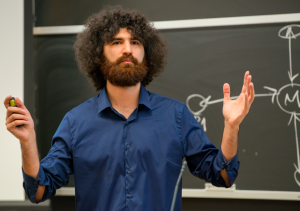 Mohammad Akbarpour is an associate professor of economics at the Stanford Graduate School of Business and an associate professor of computer science (by courtesy) at Stanford University. Akbarpour’s research focuses on market design and social networks. Recently, he has worked on problems related to inequality in market design and network targeting with applications in development economics. He is also an instructor at Khan Academy Farsi, teaching hundreds of high-school level video lessons in game theory, physics, calculus, and macroeconomics. He received his Bachelor of Science in electrical engineering from Sharif University of Technology and his PhD in economics from Stanford University.
Mohammad Akbarpour is an associate professor of economics at the Stanford Graduate School of Business and an associate professor of computer science (by courtesy) at Stanford University. Akbarpour’s research focuses on market design and social networks. Recently, he has worked on problems related to inequality in market design and network targeting with applications in development economics. He is also an instructor at Khan Academy Farsi, teaching hundreds of high-school level video lessons in game theory, physics, calculus, and macroeconomics. He received his Bachelor of Science in electrical engineering from Sharif University of Technology and his PhD in economics from Stanford University.
 J. Bradford DeLong is a professor of economics at the University of California, Berkeley, a research associate of the National Bureau of Economic Research, a weblogger at the Washington Center for Equitable Growth, and a fellow of the Institute for New Economic Thinking. He joined UC Berkeley as an associate professor in 1993 and became a full professor in 1997. DeLong also served as Deputy Assistant Secretary of the Treasury for Economic Policy from 1993 to 1995. He worked on the Clinton Administration’s 1993 budget, on the Uruguay Round of the General Agreement on Tariffs and Trade, on the North American Free Trade Agreement, on macroeconomic policy, and on the unsuccessful health care reform effort. Before joining the Treasury Department, DeLong was Danziger Associate Professor in the Department of Economics at Harvard University. He has also been a John M. Olin Fellow at the National Bureau of Economic Research, an assistant professor of economics at Boston University, and a lecturer in the Department of Economics at M.I.T. DeLong is the author of Slouching Towards Utopia: An Economic History of the Twentieth Century (2022) and co-author, with Martha Olney, of the textbook Macroeconomics (2002). He also co-edited After Piketty: The Agenda for Economics and Inequality (2017) with Heather Boushey and Marshall Steinbaum; and co-authored Concrete Economics: The Hamilton Approach to Economic Growth and Policy (2016) with Stephen Cohen. DeLong received his BA and PhD in economics from Harvard University.
J. Bradford DeLong is a professor of economics at the University of California, Berkeley, a research associate of the National Bureau of Economic Research, a weblogger at the Washington Center for Equitable Growth, and a fellow of the Institute for New Economic Thinking. He joined UC Berkeley as an associate professor in 1993 and became a full professor in 1997. DeLong also served as Deputy Assistant Secretary of the Treasury for Economic Policy from 1993 to 1995. He worked on the Clinton Administration’s 1993 budget, on the Uruguay Round of the General Agreement on Tariffs and Trade, on the North American Free Trade Agreement, on macroeconomic policy, and on the unsuccessful health care reform effort. Before joining the Treasury Department, DeLong was Danziger Associate Professor in the Department of Economics at Harvard University. He has also been a John M. Olin Fellow at the National Bureau of Economic Research, an assistant professor of economics at Boston University, and a lecturer in the Department of Economics at M.I.T. DeLong is the author of Slouching Towards Utopia: An Economic History of the Twentieth Century (2022) and co-author, with Martha Olney, of the textbook Macroeconomics (2002). He also co-edited After Piketty: The Agenda for Economics and Inequality (2017) with Heather Boushey and Marshall Steinbaum; and co-authored Concrete Economics: The Hamilton Approach to Economic Growth and Policy (2016) with Stephen Cohen. DeLong received his BA and PhD in economics from Harvard University.
Hilary Hoynes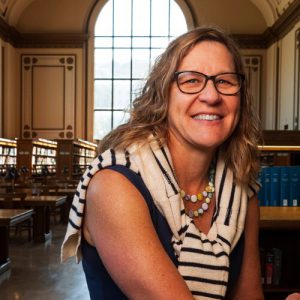 is a professor of economics and public policy and holds the Haas Distinguished Chair in Economic Disparities at the University of California, Berkeley, where she also co-directs the Berkeley Opportunity Lab. Her research focuses on poverty, inequality, food and nutrition programs, and the impacts of government tax and transfer programs on low income families. She is a member of the American Academy of Arts and Sciences, the National Academy of Social Insurance, and a fellow of the Society of Labor Economists. She has served as co-editor of the American Economic Review and the American Economic Journal: Economic Policy. She currently serves on the National Academy of Sciences Committee on Building an Agenda to Reduce the Number of Children in Poverty by Half in 10 Years. Previously, she was a member of the American Economic Association’s Executive Committee and the Federal Commission on Evidence-Based Policy Making. In 2014, she received the Carolyn Shaw Bell Award from the Committee on the Status of Women in the Economics Profession of the American Economic Association. Hoynes received her undergraduate degree in economics and mathematics from Colby College and her PhD in economics from Stanford University.
is a professor of economics and public policy and holds the Haas Distinguished Chair in Economic Disparities at the University of California, Berkeley, where she also co-directs the Berkeley Opportunity Lab. Her research focuses on poverty, inequality, food and nutrition programs, and the impacts of government tax and transfer programs on low income families. She is a member of the American Academy of Arts and Sciences, the National Academy of Social Insurance, and a fellow of the Society of Labor Economists. She has served as co-editor of the American Economic Review and the American Economic Journal: Economic Policy. She currently serves on the National Academy of Sciences Committee on Building an Agenda to Reduce the Number of Children in Poverty by Half in 10 Years. Previously, she was a member of the American Economic Association’s Executive Committee and the Federal Commission on Evidence-Based Policy Making. In 2014, she received the Carolyn Shaw Bell Award from the Committee on the Status of Women in the Economics Profession of the American Economic Association. Hoynes received her undergraduate degree in economics and mathematics from Colby College and her PhD in economics from Stanford University.
 Chris Miller is an associate professor of international history at the Fletcher School of Law and Diplomacy, Tufts University, where his research focuses on technology, geopolitics, economics, international affairs, and Russia. He is author of Chip War: The Fight for the World’s Most Critical Technology, a geopolitical history of the computer chip. He is the author of three other books on Russia, including Putinomics: Power and Money in Resurgent Russia; We Shall Be Masters: Russia’s Pivots to East Asia from Peter the Great to Putin; and The Struggle to Save the Soviet Economy: Mikhail Gorbachev and the Collapse of the USSR. He has previously served as the associate director of the Brady-Johnson Program in Grand Strategy at Yale, a lecturer at the New Economic School in Moscow, a visiting researcher at the Carnegie Moscow Center, a research associate at the Brookings Institution, and as a fellow at the German Marshall Fund’s Transatlantic Academy. Miller received his PhD and MA from Yale University and his BA in history from Harvard University.
Chris Miller is an associate professor of international history at the Fletcher School of Law and Diplomacy, Tufts University, where his research focuses on technology, geopolitics, economics, international affairs, and Russia. He is author of Chip War: The Fight for the World’s Most Critical Technology, a geopolitical history of the computer chip. He is the author of three other books on Russia, including Putinomics: Power and Money in Resurgent Russia; We Shall Be Masters: Russia’s Pivots to East Asia from Peter the Great to Putin; and The Struggle to Save the Soviet Economy: Mikhail Gorbachev and the Collapse of the USSR. He has previously served as the associate director of the Brady-Johnson Program in Grand Strategy at Yale, a lecturer at the New Economic School in Moscow, a visiting researcher at the Carnegie Moscow Center, a research associate at the Brookings Institution, and as a fellow at the German Marshall Fund’s Transatlantic Academy. Miller received his PhD and MA from Yale University and his BA in history from Harvard University.
 Ricardo Reis is the A.W. Phillips Professor of Economics at the London School of Economics. Previously, he was on the faculty at Columbia University from 2008–16, and Princeton University from 2004–08. Reis is an academic consultant for the Bank of England, the Riksbank, and the Federal Reserve Bank of Richmond. He also directs the ESRC Centre for Macroeconomics in the UK, and serves on the council or as an advisor of multiple organizations. He has published widely on macroeconomics, including both monetary and fiscal policy, inflation and business cycles. His main areas of research are inflation expectations, unconventional monetary policies and the central bank’s balance sheet, disagreement and inattention, business cycle models with inequality, automatic stabilizers, sovereign-bond backed securities, and the role of capital misallocation in the European slump and crisis. Recent honors include: 2022 Carl Menger Prize jointly awarded by the Deutsche Bundesbank, the Oesterreichische Nationalbank, and the Swiss National Bank; 2021 Yrjö Jahnsson Award given by the European Economic Association; 2017 Banque de France/Toulouse School of Economics Junior Prize; and 2016 Bernácer Prize. Reis received his B.Sc. from the London School of Economics and his PhD from Harvard University.
Ricardo Reis is the A.W. Phillips Professor of Economics at the London School of Economics. Previously, he was on the faculty at Columbia University from 2008–16, and Princeton University from 2004–08. Reis is an academic consultant for the Bank of England, the Riksbank, and the Federal Reserve Bank of Richmond. He also directs the ESRC Centre for Macroeconomics in the UK, and serves on the council or as an advisor of multiple organizations. He has published widely on macroeconomics, including both monetary and fiscal policy, inflation and business cycles. His main areas of research are inflation expectations, unconventional monetary policies and the central bank’s balance sheet, disagreement and inattention, business cycle models with inequality, automatic stabilizers, sovereign-bond backed securities, and the role of capital misallocation in the European slump and crisis. Recent honors include: 2022 Carl Menger Prize jointly awarded by the Deutsche Bundesbank, the Oesterreichische Nationalbank, and the Swiss National Bank; 2021 Yrjö Jahnsson Award given by the European Economic Association; 2017 Banque de France/Toulouse School of Economics Junior Prize; and 2016 Bernácer Prize. Reis received his B.Sc. from the London School of Economics and his PhD from Harvard University.
 Azizbek Tokhirov is a PhD student at CERGE-EI and GEOMIGRACE. His main research area is development economics. He investigates the behavioral implications of local and global economic phenomena. In 2022, he was awarded the 2nd prize in the Young Economist of the Year competition conducted by the Czech Economic Society for the paper: “Female Labor Supply Consequences of Ethnic Riots: Theory and Evidence from Kyrgyzstan.” Prior to pursuing a PhD degree, he studied in a multidisciplinary GLODEP master program and received his Bachelor of Science in Economics with Finance from University of Westminster, London.
Azizbek Tokhirov is a PhD student at CERGE-EI and GEOMIGRACE. His main research area is development economics. He investigates the behavioral implications of local and global economic phenomena. In 2022, he was awarded the 2nd prize in the Young Economist of the Year competition conducted by the Czech Economic Society for the paper: “Female Labor Supply Consequences of Ethnic Riots: Theory and Evidence from Kyrgyzstan.” Prior to pursuing a PhD degree, he studied in a multidisciplinary GLODEP master program and received his Bachelor of Science in Economics with Finance from University of Westminster, London.
 Matthew Yglesias writes the “Slow Boring” blog and newsletter, and is the co-founder and former senior correspondent for Vox. He also is a regular contributor to NPR’s All Things Considered and hosted the political podcast “The Weeds.” Prior to Vox, he was a columnist for Slate, a senior fellow at the Center for American Progress, and wrote for The American Prospect and The Atlantic. He is the author of Heads in the Sand: How the Republicans Screw Up Foreign Policy and Foreign Policy Screws Up the Democrats (2008), The Rent Is Too Damn High: What To Do About It, And Why It Matters More Than You Think (2012) and, most recently, One Billion Americans: The Case for Thinking Bigger (2020): “If the most challenging crisis in living memory has shown us anything, it’s that America has lost the will and the means to lead. We can’t compete with the huge population clusters of the global marketplace by keeping our population static or letting it diminish, or with our crumbling transit and unaffordable housing. The winner in the future world is going to have more—more ideas, more ambition, more utilization of resources, more people.” Yglesias holds a BA in philosophy from Harvard University.
Matthew Yglesias writes the “Slow Boring” blog and newsletter, and is the co-founder and former senior correspondent for Vox. He also is a regular contributor to NPR’s All Things Considered and hosted the political podcast “The Weeds.” Prior to Vox, he was a columnist for Slate, a senior fellow at the Center for American Progress, and wrote for The American Prospect and The Atlantic. He is the author of Heads in the Sand: How the Republicans Screw Up Foreign Policy and Foreign Policy Screws Up the Democrats (2008), The Rent Is Too Damn High: What To Do About It, And Why It Matters More Than You Think (2012) and, most recently, One Billion Americans: The Case for Thinking Bigger (2020): “If the most challenging crisis in living memory has shown us anything, it’s that America has lost the will and the means to lead. We can’t compete with the huge population clusters of the global marketplace by keeping our population static or letting it diminish, or with our crumbling transit and unaffordable housing. The winner in the future world is going to have more—more ideas, more ambition, more utilization of resources, more people.” Yglesias holds a BA in philosophy from Harvard University.
Short-Term Visitors, 2021-2022
David Autor is the Ford Professor of Economics and associate head of the economics department at Massachusetts Institute of Technology (MIT). He also serves as co-director of the NBER Labor Studies Program; and co-leader of both the MIT Work of the Future Task Force and the Abdul Latif Jameel Poverty Action Lab (J-PAL) North America Work of the Future Initiative. His scholarship explores the labor-market impacts of technological change and globalization on job polarization, skill demands, earnings levels and inequality, and electoral outcomes. He has received numerous awards, including the National Science Foundation CAREER Award, an Alfred P. Sloan Foundation Fellowship, the Sherwin Rosen Prize for outstanding contributions to the field of Labor Economics, and the Andrew Carnegie Fellowship. Autor was recognized by Bloomberg as one of the 50 people who defined global business in 2017. He received a special award commemorating the 25th Heinz Awards Anniversary in 2020: “For transforming our understanding of how globalization and technological change are impacting jobs and earning prospects for American workers.” Autor received his BA from Tufts University in psychology (concentration in computer science) and his PhD in public policy from the John F. Kennedy School of Government at Harvard University.
is the Ford Professor of Economics and associate head of the economics department at Massachusetts Institute of Technology (MIT). He also serves as co-director of the NBER Labor Studies Program; and co-leader of both the MIT Work of the Future Task Force and the Abdul Latif Jameel Poverty Action Lab (J-PAL) North America Work of the Future Initiative. His scholarship explores the labor-market impacts of technological change and globalization on job polarization, skill demands, earnings levels and inequality, and electoral outcomes. He has received numerous awards, including the National Science Foundation CAREER Award, an Alfred P. Sloan Foundation Fellowship, the Sherwin Rosen Prize for outstanding contributions to the field of Labor Economics, and the Andrew Carnegie Fellowship. Autor was recognized by Bloomberg as one of the 50 people who defined global business in 2017. He received a special award commemorating the 25th Heinz Awards Anniversary in 2020: “For transforming our understanding of how globalization and technological change are impacting jobs and earning prospects for American workers.” Autor received his BA from Tufts University in psychology (concentration in computer science) and his PhD in public policy from the John F. Kennedy School of Government at Harvard University.
David Card is the Class of 1950 Professor of Economics at the University of California, Berkeley, and director of the Center for Labor Economics and the Econometric Lab. Before joining Berkeley he taught at University of Chicago in 1982‐83 and Princeton University from 1983 to 1996. He has held visiting appointments at Columbia University, Harvard University, UCLA, and the Center for Advanced Study in the Behavioral Sciences. From 2012 to 2017 he was director of the Labor Studies Program at the National Bureau of Economic Research. Card’s research interests include wage determination, education, inequality, immigration, and gender‐related issues. He co‐authored the 1995 book Myth and Measurement: The New Economics of the Minimum Wage, co‐edited eight additional titles, and has published over 100 journal articles and book chapters. In 1995, he received the American Economic Association’s John Bates Clark Prize, which is awarded to the economist under 40 whose work is judged to have made the most significant contribution to the field. He was president of the AEA in 2021 and co‐recipient of the Nobel Memorial Prize in Economics in 2021.
is the Class of 1950 Professor of Economics at the University of California, Berkeley, and director of the Center for Labor Economics and the Econometric Lab. Before joining Berkeley he taught at University of Chicago in 1982‐83 and Princeton University from 1983 to 1996. He has held visiting appointments at Columbia University, Harvard University, UCLA, and the Center for Advanced Study in the Behavioral Sciences. From 2012 to 2017 he was director of the Labor Studies Program at the National Bureau of Economic Research. Card’s research interests include wage determination, education, inequality, immigration, and gender‐related issues. He co‐authored the 1995 book Myth and Measurement: The New Economics of the Minimum Wage, co‐edited eight additional titles, and has published over 100 journal articles and book chapters. In 1995, he received the American Economic Association’s John Bates Clark Prize, which is awarded to the economist under 40 whose work is judged to have made the most significant contribution to the field. He was president of the AEA in 2021 and co‐recipient of the Nobel Memorial Prize in Economics in 2021.
Michael Keen is deputy director of the Fiscal Affairs Department of the International Monetary Fund, where he was previously head of the Tax Policy and Tax Coordination divisions. Before joining the Fund, he was Professor of Economics at the University of Essex and visiting Professor at Kyoto University. He has led technical assistance missions to nearly thirty countries on a wide range of issues in tax policy, and consulted for the World Bank, European Commission, and the private sector. He has served on the Board of the National Tax Association in the U.S., and on the editorial boards of American Economic Journal: Economic Policy, International Tax and Public Finance (of which he was joint founder), Journal of Public Economics, the Review of Economic Studies and many other journals. He is co-author of books on The Modern VAT, the Taxation of Petroleum and Minerals, and Changing Customs.
is deputy director of the Fiscal Affairs Department of the International Monetary Fund, where he was previously head of the Tax Policy and Tax Coordination divisions. Before joining the Fund, he was Professor of Economics at the University of Essex and visiting Professor at Kyoto University. He has led technical assistance missions to nearly thirty countries on a wide range of issues in tax policy, and consulted for the World Bank, European Commission, and the private sector. He has served on the Board of the National Tax Association in the U.S., and on the editorial boards of American Economic Journal: Economic Policy, International Tax and Public Finance (of which he was joint founder), Journal of Public Economics, the Review of Economic Studies and many other journals. He is co-author of books on The Modern VAT, the Taxation of Petroleum and Minerals, and Changing Customs.
Jonathan Levy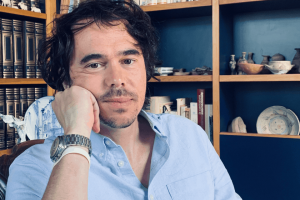 is the James Westfall Thompson Professor of US History, Fundamentals, Social Thought, and the College at the University of Chicago. Levy is a historian of economic life and of the United States, with interests in the relationships among business history, political economy, legal history, and the history of ideas and culture. He most recently completed the book Ages of American Capitalism: A History of the United States (Random House, 2021), which is a history of American economic life from British colonial settlement through the Great Recession. Much of his recent research has sought to place investment at the center of economic history and theory, and, relatedly, to contribute towards the creation of a “Keynesian” paradigm in economic history. He is currently working on three projects. The first is a book, The Real Economy, is an essay collection on economic theory and history, with a focus on capital, corporations, and profit. Another book, The Fetish of Liquidity, is a revised version of a series of lectures he gave at the École des hautes études en sciences sociales in 2017 on global economic history since the Great Depression. The final project is a climate history of the city of Houston in the late twentieth and early twenty-first centuries. Levy wrote a series of essays on this topic in 2019 for the Visualizing Climate and Loss Project at Harvard’s Center for History and Economics.
is the James Westfall Thompson Professor of US History, Fundamentals, Social Thought, and the College at the University of Chicago. Levy is a historian of economic life and of the United States, with interests in the relationships among business history, political economy, legal history, and the history of ideas and culture. He most recently completed the book Ages of American Capitalism: A History of the United States (Random House, 2021), which is a history of American economic life from British colonial settlement through the Great Recession. Much of his recent research has sought to place investment at the center of economic history and theory, and, relatedly, to contribute towards the creation of a “Keynesian” paradigm in economic history. He is currently working on three projects. The first is a book, The Real Economy, is an essay collection on economic theory and history, with a focus on capital, corporations, and profit. Another book, The Fetish of Liquidity, is a revised version of a series of lectures he gave at the École des hautes études en sciences sociales in 2017 on global economic history since the Great Depression. The final project is a climate history of the city of Houston in the late twentieth and early twenty-first centuries. Levy wrote a series of essays on this topic in 2019 for the Visualizing Climate and Loss Project at Harvard’s Center for History and Economics.
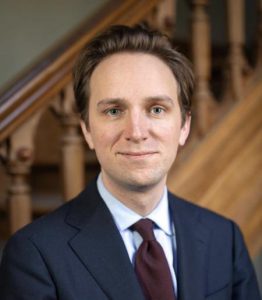 Nicholas Mulder is an assistant professor in the history department at Cornell University, in European and international history from the nineteenth century to the present. His research focuses on political, economic, and intellectual history, with particular attention to the era of the world wars between 1914 and 1945. His first book, The Economic Weapon: The Rise of Sanctions as a Tool of Modern War, appeared in January 2022 with Yale University Press. It is a history of the interwar origins of economic sanctions, showing how they reconfigured international affairs by enabling distant coercion against civilian societies in peacetime. Based on wartime blockade practices, the instrument of sanctions offered a novel way to prevent war. It became embedded in the League of Nations and national state policy, and spurred new economic interventions, as well as anti-liberal bids for autarky. The book argues that sanctions were a potent but unstable and unpredictable political tool, one whose importance to the international crisis of the 1930s and 1940s is much greater than usually assumed.
Nicholas Mulder is an assistant professor in the history department at Cornell University, in European and international history from the nineteenth century to the present. His research focuses on political, economic, and intellectual history, with particular attention to the era of the world wars between 1914 and 1945. His first book, The Economic Weapon: The Rise of Sanctions as a Tool of Modern War, appeared in January 2022 with Yale University Press. It is a history of the interwar origins of economic sanctions, showing how they reconfigured international affairs by enabling distant coercion against civilian societies in peacetime. Based on wartime blockade practices, the instrument of sanctions offered a novel way to prevent war. It became embedded in the League of Nations and national state policy, and spurred new economic interventions, as well as anti-liberal bids for autarky. The book argues that sanctions were a potent but unstable and unpredictable political tool, one whose importance to the international crisis of the 1930s and 1940s is much greater than usually assumed.
Joel Slemrod is the Paul W. McCracken Collegiate Professor of Business Economics and Public Policy at the Ross School of Business, and Professor in the Department of Economics, at the University of Michigan. He also serves as director of the Office of Tax Policy Research, an interdisciplinary research center housed at the Business School. Before coming to Michigan he was assistant professor, from 1979 to 1985 and associate professor from 1985 to 1987, at the University of Minnesota. He is co-author with Jon Bakija of Taxing Ourselves: A Citizen’s Guide to the Debate over Taxes, now in its fifth edition; with Len Burman of Taxes in America: What Everyone Needs to Know, now in its second edition; and with Christian Gillitzer of Tax Systems, published in 2014. His book with Michael Keen, Rebellion, Rascals, and Revenue: Tax Follies and Wisdom through the Ages, was published by Princeton University Press in 2021.
is the Paul W. McCracken Collegiate Professor of Business Economics and Public Policy at the Ross School of Business, and Professor in the Department of Economics, at the University of Michigan. He also serves as director of the Office of Tax Policy Research, an interdisciplinary research center housed at the Business School. Before coming to Michigan he was assistant professor, from 1979 to 1985 and associate professor from 1985 to 1987, at the University of Minnesota. He is co-author with Jon Bakija of Taxing Ourselves: A Citizen’s Guide to the Debate over Taxes, now in its fifth edition; with Len Burman of Taxes in America: What Everyone Needs to Know, now in its second edition; and with Christian Gillitzer of Tax Systems, published in 2014. His book with Michael Keen, Rebellion, Rascals, and Revenue: Tax Follies and Wisdom through the Ages, was published by Princeton University Press in 2021.
 Johannes Spinnewijn is a professor of economics at the London School of Economics and Political Science. His research focuses on topics in public economics, including the design of social insurance and tax systems. Important themes in his work are the development and implementation of evidence-based frameworks to evaluate policy and the design of optimal policies when people are subject to behavioral biases. Spinnewijn is co-editor of the Journal of Public Economics and associate editor at the Review of Economic Studies and American Economic Review. He is a research fellow at the Institute for Fiscal Studies and the Center for Economic Policy Research. Prior to joining the LSE, he completed his PhD at the Massachusetts Institute of Technology.
Johannes Spinnewijn is a professor of economics at the London School of Economics and Political Science. His research focuses on topics in public economics, including the design of social insurance and tax systems. Important themes in his work are the development and implementation of evidence-based frameworks to evaluate policy and the design of optimal policies when people are subject to behavioral biases. Spinnewijn is co-editor of the Journal of Public Economics and associate editor at the Review of Economic Studies and American Economic Review. He is a research fellow at the Institute for Fiscal Studies and the Center for Economic Policy Research. Prior to joining the LSE, he completed his PhD at the Massachusetts Institute of Technology.
Short-Term Visitors, 2020-2021
 Jonathon Hazell is a postdoctoral research associate in the Department of Economics at Princeton University. Hazell researches empirical macroeconomics, with a special focus on labor markets. Recent research topics include the relationship between wages and unemployment fluctuations, the consequences of changes in the labor share for business cycles, and the determinants of short-run fluctuations in inflation. Hazell holds a PhD from the Massachusetts Institute of Technology and a BA from the University of Cambridge. He will start as an assistant professor at the London School of Economics in 2021.
Jonathon Hazell is a postdoctoral research associate in the Department of Economics at Princeton University. Hazell researches empirical macroeconomics, with a special focus on labor markets. Recent research topics include the relationship between wages and unemployment fluctuations, the consequences of changes in the labor share for business cycles, and the determinants of short-run fluctuations in inflation. Hazell holds a PhD from the Massachusetts Institute of Technology and a BA from the University of Cambridge. He will start as an assistant professor at the London School of Economics in 2021.
 Jose P. Vasquez is a postdoctoral research associate in the Department of Economics at Princeton University. Vasquez’s research lies at the intersection of labor economics and international trade. In particular, his research focuses on the effects of globalization on both workers and firms. His recent work examines the impact of the entry and expansion of multinational corporations on the labor market and on the productivity of domestic firms in the host economy. Vasquez holds a Ph.D. from the University of California at Berkeley, an MA in economics from CEMFI, Madrid, and a BA in economics from the University of Costa Rica. Before his Ph.D., he also worked for two years as a researcher at the Central Bank of Costa Rica. Starting in 2021, he will become an assistant professor at the Department of Management of the London School of Economics.
Jose P. Vasquez is a postdoctoral research associate in the Department of Economics at Princeton University. Vasquez’s research lies at the intersection of labor economics and international trade. In particular, his research focuses on the effects of globalization on both workers and firms. His recent work examines the impact of the entry and expansion of multinational corporations on the labor market and on the productivity of domestic firms in the host economy. Vasquez holds a Ph.D. from the University of California at Berkeley, an MA in economics from CEMFI, Madrid, and a BA in economics from the University of Costa Rica. Before his Ph.D., he also worked for two years as a researcher at the Central Bank of Costa Rica. Starting in 2021, he will become an assistant professor at the Department of Management of the London School of Economics.
Index of Short-Term Visitors
- Winnie Njoroge, 3/23-27/26
- Philipp Strack, 3/16-18
- Hadar Avivi, 9/29/25 to 10/23/25
- Ilisa Goenka, 9/29/25 to 10/4/25
- Sir Timothy Besley, 9/11-17/25
- Gillian Paull, 9/11-17/25
- Michael Bordo, 9/2/25 to 5/26/26; 9/3/24 to 5/27/25; 9/12/23 to 5/28/24
- Anne Sophie Lassen, 4/15/25 to 5/15/25; 10/7/24 to 11/1/24; and 10/30/23 to 11/10/23
- Dmitry Grozoubinski, 4/7-9/25
- Adriana Kugler, 4/2/25
- Camille Landais, 3/24-28/25
- Jessica Brown, 3/17-22/25
- Claudia Goldin, 4/29/25; 8/18/22
- Yaroslav Korobka, 1/27/25 to 5/27/25
- Kory Kroft, 11/14-22/24
- Salamatu Nanna Adam, 9/3/24 to 12/20/24
- Chanelle Duley, 4/15-28/24
- Peter Ganong, 4/1-5/24
- David Leonhardt, 2/15/24
- Lyn Alden, 2/6/24
- Daron Acemoglu, 10/4/23
- Gayane Baghumyan, 10/3-10/23
- Amy Finkelstein, 10/2-3/23
- J. Bradford DeLong, 5/5/23
- Azizbek Tokhirov, 5/1-5/23
- Mohammad Akbarpour, 3/20-23/23
- Ricardo Reis, 3/3-6/23
- Matthew Yglesias, 9/15/22
- Johannes Spinnewijn, 5/2-5/22
- Nicholas Mulder, 4/6/22
- David Card, 3/23-24/22
- David Autor, 3/21-23/22
- Jonathan Levy, 11/3/21
- Michael Keen, 11/1-3/21
- Joel Slemrod, 11/1-3/21
- Austan Goolsbee, 2/24-25/20
- Thomas Philippon, 2/6/20
- Emmanuel Saez, 10/22/19
- Matthew Notowidigdo, 4/22-26/19 & 4/29-5/3/19
- Timothy Besley, 4/15-19/19
- Heidi Williams, 3/12-14/19
- Ioana Marinescu, 2/11-15/19
- Danny Yagan, 2/12-16/18 & 2/19-22/18
- Stefanie Stantcheva, 2/5-9/18 & 2/14-16/18 & 2/19-20/18
- Eric Leeper, 9/19-23/16 & 10/10-14/16 & 10/17-21/16
- John Vickers, 9/19-23/16
- Don Brash, 2/17-19/15
- Martin Parkinson, 9/23-25/15 & 10/8-9/15 & 10/12-14/15
- Jonathon Hazell, Postdoctoral Research Associate, 2020-2021
- Jose Vasquez, Postdoctoral Research Associate, 2020-2021
- Max Risch, Postdoctoral Research Associate, 2019-2020
- Scott Nelson, Postdoctoral Guest, 2018-2019
- Giorgia Barboni, Postdoctoral Research Associate, 2017-2018
